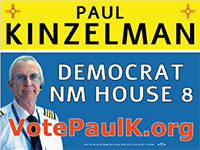View My Postcard!
View My Yard Sign
If you would like a yard sign, or if you would like to volunteer to help my campaign, please email me at VotePaulK@gmail.com.
Wealth Gap & Taxes
We have an economy that does not work for most people.
In the richest county in the world, we have millions of homeless people (many are children) and roughly SIX times that number of empty homes. How is that an economy that works?
Over a million children are food-insecure and have difficulty concentrating and applying themselves at school. Many children in America go to bed hungry in a country that has abundant food -- in fact, we have so much food that we throw away 1/3rd of the food we produce. How is that an economy that works?
Our society has the largest gap in 100 years between the very wealthy and the rest of us -- an inequality that is fostered by both political parties. We are regressing from a healthy economy based on capitalism toward the economy of the Middle Ages. It seems like we’ve come full circle from those dark times, when the economic system consisted of the few nobility (the 1%) that owned everything, and the far great number of serfs and servants (the 99%) who owned nothing and lived in poverty, with no hope of rising up out of that poverty. How is that an economy that works?
In spite of what you might think from the IRS tax tables, the extremely wealthy pay taxes at a much lower rate than the Middle Class -- many wealthy people pay about 1/2 that rate. This article describes how the COVID-19 crisis has made the wealth gap even worse. The Covid-19 crisis has also shown that the most essential workers, the ones that we rely on for smooth functioning of our society, are usually the lowest-paid workers. Clearly our investment in huge salaries for the investor class is not beneficial for society.
A myriad of tax loopholes allow this inequity. Watch this billionaire explain why the loopholes for the rich and corporations need to be substantially eliminated: Nick Hanauer - Beware Fellow Plutocrats. The Pitchforks are Coming (NOTE: This TED talk was removed at one time because it was "too controversial".)
Having too many ultra wealthy people in our society subverts our democracy, because the wealthy can buy their way around the laws and rules that the rest of us must follow. They 'purchase' (i.e. “lobby”) legislators to insert loopholes in the tax code to make more money for themselves.
The most obvious recent example of the purchasing power of the rich is Michael Bloomberg's purchase of his podium at the Democratic debate. Fortunately, Mr. Bloomberg's attempted subversion was so obvious that the voters rejected him.
Another example of money subverting democracy is the legislators who oppose universal healthcare and accept huge campaign ‘contributions’ to vote against universal healthcare.
Why should an unelected person, not accountable to anybody, make decisions that affect all of us just because they have huge amounts of wealth? That is the responsibility of government by the people, for the people so we can all participate in these decisions (at least in theory). These examples demonstrate how the power of money corrodes our system.
We need a tax code that's simple, equitable, and eliminates the loopholes, and we need to raise taxes on the rich to reverse the devastating upward redistribution of wealth, to redistribute the stolen wealth back to the Middle Class. I support Elizabeth Warren's "wealth tax". We should change the rules of the economy to prevent anybody from amassing huge fortunes, because that amassing equates to hoarding money that should be circulating in the economy that sustains all the people.
"As riches increase and accumulate in few hands . . . the tendency of things will be to depart from the republican standard." --Alexander Hamilton
“You can have great wealth or democracy; you can have one or the other, but not both." --Justice Louis Brandeis
"When economic power became concentrated in a few hands, then political power flowed to those possessors and away from the citizens, ultimately resulting in an oligarchy or tyranny." --John Adams
"An imbalance between rich and poor is the oldest and most fatal ailment of all republics." --Plutarch
This is a wonderful article in the Albuquerque Journal about how we can break the cycle of poverty that affects so many New Mexicans. (If you are a subscriber you can view it.) Data Over Dogma: How to Beat Poverty in New Mexico.



